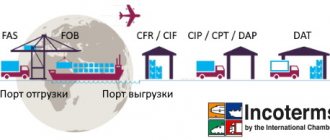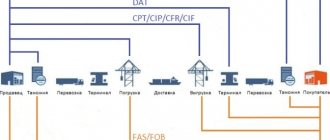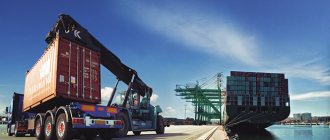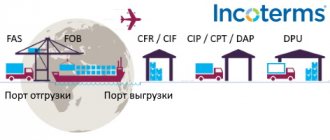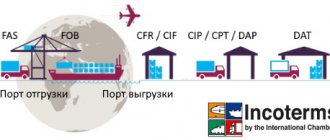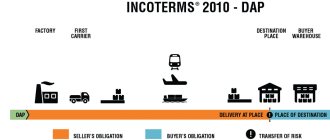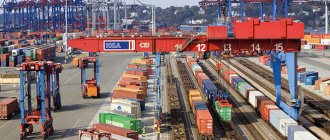What are Incoterms and what are they for?
Incoterms (or in Russian "Incoterms") are a set of standard terms of delivery of goods for use in international trade. The main advantage of Incoterms is its unambiguous interpretation throughout the world.
The system itself appeared in 1936 and has since gone through several editions, the latest being Incoterms-2010. The 2021 version is currently in development.
What essential delivery terms are determined by the Incoterms basis:
- distribution between the seller and the buyer of the costs of delivery and customs clearance of goods, i.e. what logistics services are included in the price of the product;
- the moment of transfer from the seller to the buyer of the risks of damage, loss or accidental destruction of the cargo;
- the moment of delivery by the seller.
Incoterms are optional, and you are free to include any other terms in the contract, but I do not recommend doing so. On the contrary, the wording on the mandatory execution of Incoterms in a foreign trade contract will be an example of good legal practice.
Why is this so important?
Because the costs of delivery and customs clearance may exceed the purchase price of the product itself. And who will bear them: the seller or the buyer will significantly affect your financial result.
Agree, the price is $10 with delivery of the goods at the factory gate in the country of manufacture (EXW) and the same $10, but including export registration and delivery to the Russian Federation (CFR) - these are, as they say in Odessa, two big differences!
Therefore, when comparing prices from different suppliers, it is necessary to pay attention to the stated conditions according to Incoterms. Or decide in advance what you need and immediately request an EXW, FOB or CFR price.
Not just 3 letters
Before moving on to a review of the conditions themselves, it is necessary to note one more important point. In practice, in addition to the code, a geographical name, usually a city, is always indicated. For example, EXW Shenzhen or CFR Vladivostok. This place is usually called the “supply base” .
The point is that the same delivery included in the price should not be carried out “in general”, but to a strictly defined place. Continuing with the previous example, we can say that for a client in the north-west of Russia, CFR Vladivstok is not the same as CFR Saint-Petersburg.
Thus, to fully and completely understand the terms of your import transaction, you need to know the Incoterms code and the delivery basis.
Delivery terms Incoterms 2010
GENERAL PROVISIONS
1.1. These rules govern the relationship between the Visitor/User/Customer and the Contractor for the provision of Services. 1.2. The Contractor posts on the Site information about the Services offered and other information related to the activities of the Contractor. Changes, including information about the provision of Services on the Site and their cost, are made by the Contractor unilaterally without prior notice to the User. The information is valid until the Contractor makes appropriate changes, unless another period is additionally specified by the Contractor. 1.3. Full and unconditional consent and acceptance of these Rules is the placement by the Customer of the Application in the manner established on the Site.
TERMS USED
2.1. Site visitor is a person who came to the Site without the purpose of placing an Application. 2.2. User - a visitor to the Site who accepts the terms of this Agreement and wishes to place an Application on the Site. 2.3. Customer - the User who placed the Application on the Site. 2.4. Contractor - a legal entity whose description of the Services is posted on the Site. Information about the legal entity: Kvazar LLC (OGRN 1142536007790, INN 2536276283, KPP 253601001, location: Vladivostok, Dalzavodskaya str., 2a. Office 218.) 2.5. Website - an Internet site owned by the Contractor, located on the Internet at https://cc-customs.ru, where the Services are presented. 2.6. Services - information services provided by the Contractor and available for Applications on the Site. 2.7. Application - a duly completed request from the Customer for the provision of the Service selected on the Site.
PROTECTION OF PERSONAL INFORMATION
3.1. By providing his personal data when submitting an application form on the Site, the Customer gives the Contractor his consent to the processing and use of his personal data in accordance with Federal Law No. 152-FZ “On Personal Data” dated July 27, 2006 in various ways indefinitely and for the purposes specified in this Agreement. 3.2. The Contractor uses the Customer’s personal data for the purposes of: — filling out an Application by the Customer on the Site; — feedback from the Customer. 3.3. Personal data collected by the Contractor: - Customer's phone number; — Customer’s email address; — Full name of the Customer. 3.4. The Contractor undertakes not to disclose information received from the Customer. At the same time, disclosure of information is not considered a violation of obligations in the case where the obligation for such disclosure is established by the requirements of the current legislation of the Russian Federation. 3.5. The Customer may withdraw his consent to the processing of personal data after personally contacting the Contractor.
FINAL PROVISIONS
4.1. The Contractor reserves the right to make unilateral changes to these rules. Changes to the terms of these rules come into force after they are published on the Site.
Condition groups
The areas of responsibility of the supplier and buyer, as well as the moments of transfer of risk, according to Incoterms 2010
The first letter of the abbreviation defines the so-called group of conditions, which, in turn, indicates the moment of transfer of obligations and risks:
- group E (EXW) - no logistics in the price of the product, all risks are borne by the buyer;
- group F (FAS, FOB, FCA) - the main transportation is not paid by the seller, the price only includes delivery of the goods to the departure terminal and loading into the vehicle;
- group C (CFR, CIF, CPT, CIP) - the main carriage is paid by the seller, the price only includes delivery of the goods to the arrival terminal;
- group D (DAT, DAP, DDP) - delivery to the destination is paid by the seller.
In the practice of wholesale supplies, group D is rarely used, because it is more convenient and cheaper to work with transport and customs in Russia on your own than to trust a foreign supplier. Therefore, within the framework of this article, I will not consider the conditions of group D.
Sea and everything else
Delivery by sea has its own specifics, therefore, separate Incoterms are formulated for sea freight: FAS, FOB, CFR and CIF. Taking into account the fact that they essentially repeat their “land” counterpart, these terms will be considered together.
Explanation of delivery conditions according to INCOTERMS 2010
The existing provisions of INCOTERMS provide a clear explanation of the obligations of the contracting parties arising from these methods of transportation, as well as the risks generated and the circumstances of the transfer of ownership from the seller to the buyer.
The name of the transaction used in the purchase and sale contract must be fully consistent with:
- type of product,
- the method of its delivery,
- nature of risk compensation.
Table of basic conditions, moment of risk transfer and ownership rights
The application of the concepts can be outlined in the following table:
| Number in order | Abbreviation | general characteristics | Key requirements for the seller | Key requirements for the buyer |
| 1 | EXW | “Ex-factory” or EXW - the delivery basis is used for all types of transportation and for several types at once. The goods are released directly from the supplier's warehouse. | Providing an invoice. | Loading, customs formalities. Acceptance of risks from the moment the goods are posted on the invoice. |
| 2 | FCA | "Free carrier". Sale of goods after they have been cleared by the customs service. The place of shipment is determined and indicated by the seller. Read more about FCA delivery under INCOTERMS 2010 here. | Providing an invoice. Obtaining an export license. Full implementation of customs formalities. | Payment for goods. Compensation for customs expenses. Reimbursement of import license. |
| 3 | INCOTERMS 2010 CPT | “Carriage paid to” destination. The seller pays full transportation costs. In this case, the buyer assumes all transportation risks. | Providing an invoice. Registration and payment of an export license and all customs formalities for export. | Payment for goods. Registration and payment of the cost of an import license. |
| 4 | INCOTERMS 2010 CIP | “Cost and insurance paid up to” the place specified in the contract. | Providing an invoice. Loading of goods. Payment for transportation and minimum insurance. Carrying out customs formalities for export. | Payment for goods. Transportation insurance reimbursement is higher than the minimum expenses. Customs clearance upon import. |
| 5 | DAT | Delivery terms DAT INCOTERMS 2010 stands for “delivery at terminal”. The sales contract provides for the movement of cargo to the terminal. | Providing accompanying documents. Delivery to the cargo terminal and unloading of goods there. From the moment of unloading at the terminal and handing over the goods, the risks of its contents and storage pass to the buyer. | Pays for the goods and takes responsibility for damage to the goods during unloading. Organizes clearance of transportation across the border, paying all customs duties or licenses. |
| 6 | DAP | "Delivery to destination." DAP terms of delivery apply to any mode of transport and replace the term DES, which was used in 2000 only in relation to the delivery of goods by ship. | Pays for transportation to the destination, and also carries out clearance and bears customs expenses. | Full payment. Unloading goods. |
| 7 | DDP | “Delivered Duty Paid.” The cargo is delivered to the destination designated by the contract completely free of state duties, with all customs documents. | Provision of licenses. Payment for customs expenses. Reimbursement of transportation costs. Read more about the delivery of DDP INCOTERMS 2010 here. | Payment for fully customs cleared goods. |
| 8 | FAS INCOTERM 2010 | "Free along the side of the ship." Used to transport goods by water. The trade contract specifies not just the port of destination, but specifically the berth from which the ship will be loaded. | Delivery of cargo to the specified berth. Providing a set of accompanying documents: licenses, certificates. | Payment for goods. Chartering a vessel. Cargo insurance. |
| 9 | FOB | "Free on board." The goods are delivered to the deck of the ship. | The FOB delivery basis involves loading on board the ship with the provision of all documents, including export declarations. | Payment for goods and all customs costs for their import. Chartering a ship and storing cargo on the ship. |
| 10 | CFR | "Cost and freight". CFR terms according to INCOTERMS 2010 imply delivery of goods by the seller on board the ship. | Bears all costs of freight and delivery of cargo to the port of destination. | Pays for the goods and all expenses incurred as a result of damage to the cargo after the goods are handed over by the seller. |
| 11 | INCOTERM 2010 CIF | "Cost, Insurance and Freight." Delivery of commercial cargo directly on board the vessel. Freight at the expense of the seller. Payment by them of all expenses for delivery of cargo to the port of destination. | Payment of costs for the delivery of goods to the ship and its delivery to the port of destination. Completion of export customs formalities and their payment. | Payment for goods, as well as expenses for completing import customs formalities. |
Contents of Incoterms
So, here is a list of the main terms of delivery according to Inceterms and their brief description:
EXW (ex works, ex-factory)
The goods are transferred in the country of manufacture, usually on the territory of the supplier’s factory or warehouse. Delivery is considered completed when the goods have crossed the warehouse gates. From that moment on, the risk of loss of goods falls on the buyer.
All logistics and customs clearance of export and import are also paid by the buyer.
FCA (free carrier, free carrier) and FOB (free on board)
The price of the goods includes delivery to the departure terminal and export processing.
FOB terms apply exclusively to sea shipping. In accordance with them, the price of the goods includes the loading of the goods on board the ship, and the moment of transfer of risks and responsibility from the seller to the buyer is when the goods cross the ship's rail (romantically). For all other modes of transport, FCA is used.
Another option is FAS (free alongside ship) - this is almost a complete analogue of FOB, but does not include loading goods on board the vessel. In my practice, I have never seen examples of using FAS.
The key point of group F conditions for the importer is the supplier’s obligation to formalize the export of goods. Any problems at customs in the country of departure will become his, and not our, “headache”!
Incoterms 2010 (Incoterms 2010)
Home Useful Incoterms 2010 (Incoterms 2010)
Incoterms 2010 are international rules accepted by government agencies, law firms and traders around the world as the interpretation of the most applicable terms in international trade.
The scope of Incoterms 2010 (Incoterms 2010) extends to the rights and obligations of the parties under a sales contract regarding the supply of goods (terms of delivery of goods).
The main purpose of Incoterms 2010 is considered to provide international rules for the interpretation of key trade terms in a given industry, and with the help of Incoterms 2010, uncertainty in the interpretation of these terms can be avoided.
Incoterms 2010 distinguishes 4 groups of contract types, which apply either to any type of transport or only to water transport. Brief characteristics of each group and the types of contracts related to it are presented in the table below.
| Group | Term designation | Explanation of the term | Kind of transport | Characteristics and responsibilities of the parties | |
| In English | In Russian | ||||
| Group "E" | EXW | EX WORKS | FRANCO PLANT (name of place) | Any | The goods are delivered from the seller’s warehouse, or “pickup” |
| Group "F" | FCA | FREE CARRIER | FREE CARRIER (name of destination) | Any | The main freight is not paid by the seller. The seller undertakes to provide the goods, which have passed customs clearance, to the carrier specified by the buyer at the specified place |
| F.A.S. | FREE ALONGSIDE SHIP | FREE ALONG THE SHIP (name of port of shipment) | Water | The main freight is not paid by the seller. The seller undertakes to deliver the goods to the appointed place and pay for the transportation of the goods to the ship at the port of shipment, the buyer undertakes to pay for the loading of the goods on board the ship | |
| FOB | FREE ON BOARD | FREE ON BOARD (name of port of shipment) | Water | The main freight is not paid by the seller. The seller undertakes to deliver the goods to the port of destination, load them onto the specified ship, all costs of transporting and loading the goods on board are included in the cost of the cargo | |
| Group "C" | CFR | COST AND FREIGHT | COST AND FREIGHT (name of destination port) | Water | The main freight is paid by the seller. The cost of the cargo will include the cost of its production and transportation to the port of destination |
| CIF | COST, INSURANCE AND FREIGHT | COST, INSURANCE AND FREIGHT (name of port of destination) | Water | The main freight is paid by the seller. The cost of the cargo includes the costs of production of the goods, its transportation to the port of destination, as well as the cost of insurance | |
| CPT | CARRIAGE PAID TO | FREIGHT/CARRIAGE PAID TO (name of destination) | Any | The main freight is paid by the seller. The seller is responsible for freight and transportation of the goods to the port of destination, the buyer is responsible for insuring the transported cargo | |
| C.I.P. | CARRIAGE AND INSURANCE PAID TO | FREIGHT/SHIPPING AND INSURANCE PAID TO (name of destination) | Any | The main freight is paid by the seller. The seller undertakes to deliver the goods to the specified carrier and pay the costs associated with transporting the goods to the port of destination | |
| Group "D" | DAT | DELIVERED AT TERMINAL | DELIVERY AT THE TERMINAL | Any type of transport when the goods are delivered to the land border) | The goods are delivered at the specified terminal |
| DAP | DELIVERED AT POINT | DELIVERY AT DESTINATION | Water or multimodal transport, when the goods arrive at the destination port on a ship | Destination specified - delivery is carried out at the specified point | |
| DDP | DELIVERY DUTY PAID | DELIVERY WITH DUTIES PAID (name of destination) | Any | The seller undertakes to provide the goods, which have passed customs clearance and have not been unloaded, to the specified place | |
CPT (carriage paid to) and CFR (cost and freight)
The price of the product includes all logistics “on the other side” and the main transportation to the destination country: by sea (CFR) or any other transport (CPT). The supplier bears the costs and risks of customs clearance of exports in the country of departure.
The goods are transferred to the buyer at the arrival terminal in the destination country: seaport or airport, railway or automobile terminal. Please note that the risk of loss and accidental destruction passes to the buyer the moment the shipment leaves the departure terminal.
